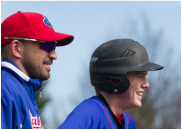During this time of the year many players have just gone through the evaluation process. The majority of players who are involved in competitive athletics will be left off a roster at some point in their playing career. This post was originally from March 2015, but I have added a few updates to help players take some positives out of an otherwise negative situation.
1. This is not the end...it should be the beginning: Whether you made the team or you were left off the roster, it is important to remember that your work is just getting started. For the players who were cut, it tends to go one of two directions. Players either become extremely motivated to improve in the areas that were exposed during the evaluation or they become de-motivated because they believe their careers are somehow over. Players need to remember that baseball is a late development sport and here in Canada we don't start truly "weeding players out" in their early teens. After getting past the initial feelings of disappointment, players need to assess their strengths, determine the weaknesses that were exposed by the evaluation, ask the evaluators for an honest assessment of their skill set, and set a plan for improvement.
2. Understand the process of forming a team: Players and parents sometimes forget that there is more to creating a team than simply selecting the best 14-16 players. Evaluations generally start with a determination of individual skill sets but the process ends with a depth chart and an understanding of where every player fits on the field. It wouldn't make much sense to carry 6 outfielders or 4 catchers because there simply wouldn't be enough innings to go around. In addition, tournament teams place a high priority on depth of pitching and this can have a big influence on the final 3 or 4 rosters spots.
3. Prove them wrong: Let's be clear - coaches do NOT enjoy cutting players. Although it is a part of the job, it is not enjoyable and when it comes to the players who were cut, the best coaches want to be proved wrong. Let the disappointment fuel your efforts to improve. Stay confident and play with a bit of a "chip" on your shoulder.
4. Player evaluation is happening everywhere: Scheduled evaluations are only part of the overall evaluation process. Coaches want to see players in skill evaluations, team practices, game situations, and around the diamond when they don't have their spikes on. Communication with current and previous coaches can provide a lot of insight into a players skill set and character. Remember that during game evaluations, coaches generally do NOT want to be seen at games because this gives them a better indication of a player’s true personality. I was recently coaching at a tournament and received a call from a college coach who had interest in a number of our players. He asked what time we were arriving at the park and I told him 2pm. He said "OK, I will be there at 1:45pm because I want to see them walk off the bus." I didn't see him until just before game time, but by that time he had a couple hours of player evaluation completed. The college coach wanted to see the way the players carried themselves, how they interacted with their teammates, how they communicated with their coaches, and how diligent they were during warm up.
5. Take feedback in relation to your game, not your friends: If you ask for feedback, analyze it as it relates to you rather than trying to understand the feedback in comparison to the rest of the group. Athletes will find that it is a lot easier to implement feedback when it is taken as a reflection of their skill set. In the end, you have control over developing your skills, but you can't control how your skills compare to another group of athletes.
6. Get your mind right: When providing feedback to players after evaluations, I try to split the conversation into two parts and I think it is helpful for athletes and parents to do the same:
First, get detailed information on why you were not selected and work to understand the areas where you need to improve. It is possible that this part of the conversation may include information about team or league structure, but don't dwell on those sections because you can not control these types of variables and worst thing for your mindset is to go into the second part of the conversation thinking you were a victim of circumstance.
Second, try to get into a more positive frame of mind by focusing on the opportunities that are still available. Be absolutely sure that you are not going to go through an entire season thinking that you deserve to be somewhere else. Armed with information on where they need to improve, you want to leave the meeting on a mission to prove the coaches wrong with your actions (see #3 above).
I hope this helps you earn your way onto a roster in the future!


 RSS Feed
RSS Feed